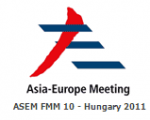The tenth Asia-Europe Meeting (ASEM) Foreign Ministers' Meeting, which was held under the theme "Working together on non-traditional security challenges," identified environmental degradation, climate change, biodiversity loss, over-exploitation of natural resources and other human pressures on the natural environment as the underlying causes of many emerging security threats.
 7 June 2011: The tenth Asia-Europe Meeting (ASEM) Foreign Ministers’ Meeting held in Gödöllő, Hungary, from 6-7 June 2011, under the theme
”Working together on non-traditional security challenges,” addressed climate change, energy and Rio+20, among other agenda items.
7 June 2011: The tenth Asia-Europe Meeting (ASEM) Foreign Ministers’ Meeting held in Gödöllő, Hungary, from 6-7 June 2011, under the theme
”Working together on non-traditional security challenges,” addressed climate change, energy and Rio+20, among other agenda items.
Preparing for the forthcoming ASEM Summit in Vientiane, Lao PDR, in 2012, ministers agreed that the wide range of non-traditional security challenges faced by Europe and Asia can impact on the stability, security and prosperity aspired to by both regions, posing grave challenges to regional and global economic growth and to people’s livelihood. They noted that the social impact of scarce food, energy and water resources, the adverse effects of climate change, and the consequences of natural disasters have serious implications on every country in Europe and Asia.
Environmental degradation, climate change, biodiversity loss, over-exploitation of natural resources and other human pressures on the natural environment were considered underlying causes of many emerging security threats. Ministers reaffirmed their commitment to pursue sustainable development in tandem with economic growth and social progress, highlighting the significance of the UN Conference on Sustainable Development (UNCSD, or Rio+20) in June 2012. Ministers expressed their commitment to sustainable development as a common denominator for achieving environmentally sustainable economic growth, social progress and environmental protection. They emphasized the transversal and central nature of the two themes of Rio+20, reiterating that sustainable development should achieve and maintain a balance between its three pillars, in line with the Rio Declaration on Environment and Development, Agenda 21, the Programme for the Further Implementation of Agenda 21, the Johannesburg Declaration on Sustainable Development and the Plan of Implementation of the World Summit on Sustainable Development.
Ministers underlined that energy security plays an important role in achieving sustainable development and acknowledged the importance of ensuring sufficient, reliable and environmentally responsible supplies of energy with diversification of sources, routes and types of energy supplies at prices reflecting economic fundamentals. In addition, they stressed that ASEM will contribute to the promotion of low-carbon green growth by facilitating the use of renewable and other non-fossil energy resource in the long-term. They also emphasized that energy efficiency and increased use of renewable energy across all sectors of the economy will become increasingly important contribution in fostering security in energy supplies while addressing climate change challenges.
On climate change, ministers acknowledged the importance of delivery of both fast-start financing and long-term finance to support concrete actions in developing countries. In light of the ongoing negotiations under the UN Framework Convention on Climate Change (UNFCCC), ministers affirmed that European and Asian partners must concur on a concrete outcome for the Durban Climate Change Conference in late 2011. Ministers recommended to fully operationalize all elements of the Cancun Agreements and expressed their aim to achieve a fair, effective and comprehensive legally-binding outcome according to the Bali Road Map. Ministers highlighted the important role of existing market-based mechanisms designed to mitigate global climate change and the need to further enhance them, as well as establish new sectoral or other scale-up market-based mechanism.
Ministers also noted that: the agricultural sector is vulnerable to climate-induced changes especially in water resource availability, but can also contribute to climate change mitigation; best agricultural practices should be further promoted; and the forest sector should further promote sustainable management of forests, including cooperation to address illegal logging in order to enhance resilience against climate change. Finally, ministers welcomed India’s offer to host the 11th ASEM Foreign Ministers’ Meeting in 2013. [Chairs’ Statement]